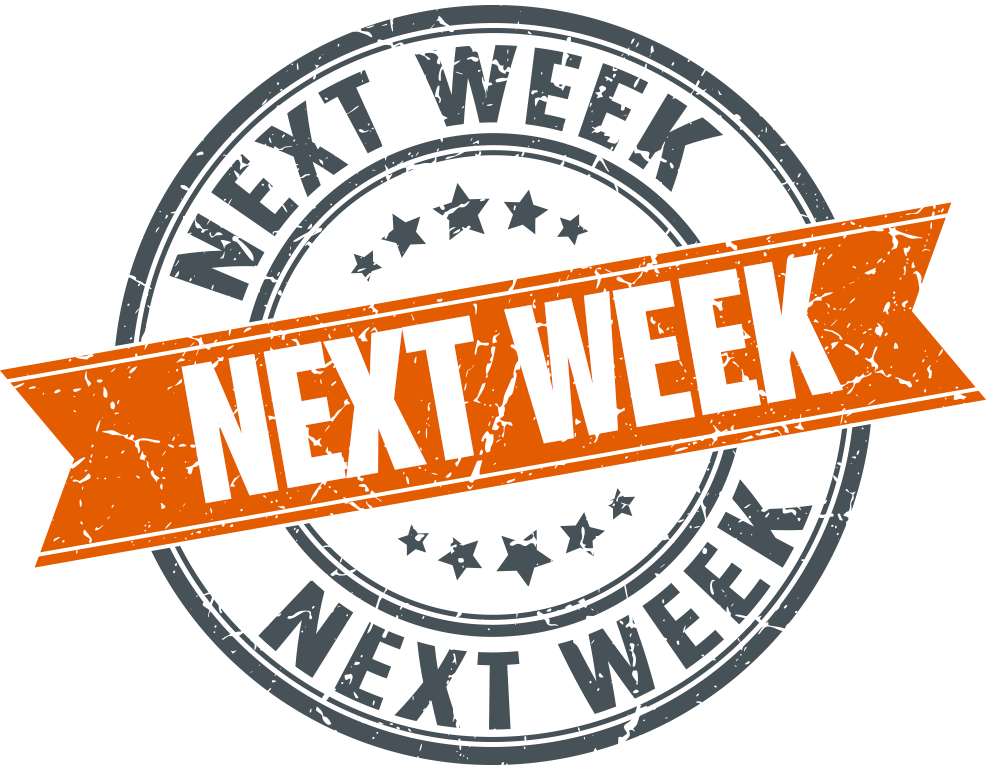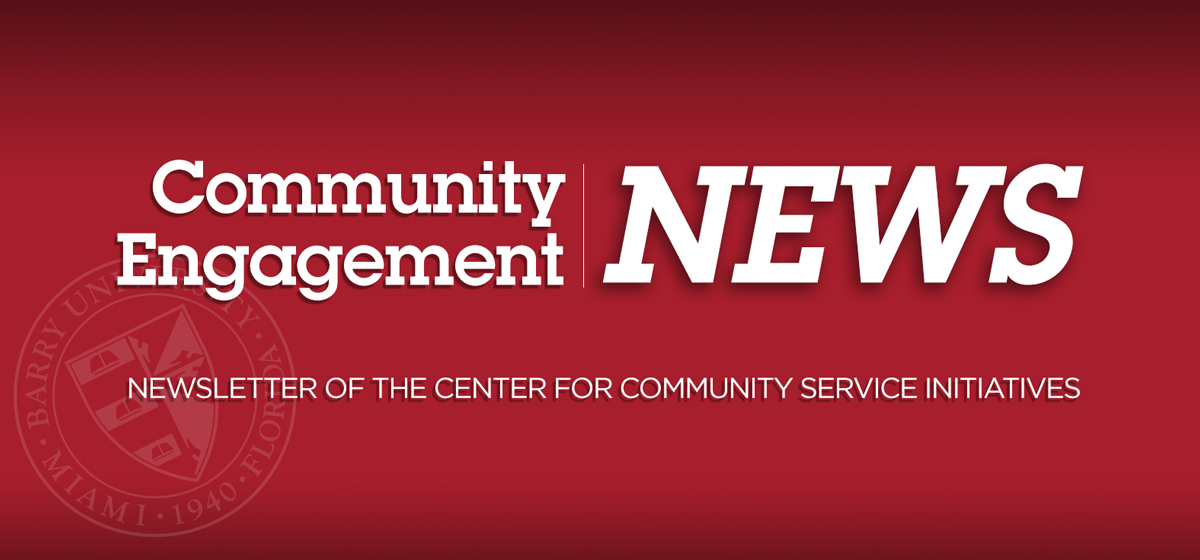January 4, 2021
IN THIS ISSUE
- Barry’s Martin Luther King, Jr. Day of Service is Saturday, January 16
- Deadline for Submission of Community Engagement Award Nominations is January 29
- Proposals for Presentations at Community Engagement Symposium Still Being Accepted
- Next Forum In Academic Year’s Deliberative Dialogue Series on Race Matters Set for February 11
- Community-Based Research Incentive: Application Submission Deadline is February 1
- Students Tackle Social Issues Through Service-Learning/Civic Engagement Projects
Barry’s Martin Luther King, Jr. Day of Service is Saturday, January 16
Onsite and Online Collaborative Projects Planned

Barry’s Martin Luther King, Jr. Day of Service is Saturday, January 16. Collaborative service projects will be implemented onsite and online between 9 a.m. and 1 p.m.
One of the onsite (in-person) projects will be at the Barry Urban Garden outside Powers Hall on the main campus. The project will involve upkeep of the garden plots and improvements to the site.
The day’s theme is “What Matters”—referencing a sermon that Dr. King delivered in Selma, Alabama, on the topic of courage. The pastor and civil rights leader encouraged parishioners to stand up for the things that matter.
Each year, on the Saturday immediately preceding MLK Day, Barry students, faculty, and staff—often joined by alumni and family members—honor King’s life and legacy by participating in a day of service. A federal holiday, MLK Day is the third Monday of January.
MLK Day of Service will be the first of two major days of service at Barry this semester, the second being Sustainability Saturday, April 17. Registration for MLK Day of Service is required. For additional information, contact the Center for Community Service Initiatives (CCSI) at service@barry.edu.
Deadline For Submission Of Community Engagement Award Nominations Is January 29


The eighth annual Community Engagement Awards Ceremony is scheduled for April 7. Students, faculty, and staff members, as well as community partners, are invited to submit nominations by January 29.
The deadline for the submission of nominations for Barry’s eighth annual Community Engagement Awards is Friday, January 29. Students, faculty, and staff members, as well as community partners, are invited to submit nominations by the deadline.
The seven categories of awards are Community Impact, Community Partnership, Community-Based Research, Community-Engaged Scholarship, Community Engagement Educator, Service-Learning Faculty, and Engaged Department.
Categories of Awards
Community Impact: For exemplary civic engagement—including service, research, and advocacy—that has a measurable impact on the community.
Community Partnership: For exemplary partnerships between University and community constituencies that produce measurable improvements in people’s lives while enhancing higher education.
Community-Based Research: For rigorous research with community partners in response to community concerns, issues, or needs.
Community-Engaged Scholarship: For significant scholarly work across the faculty roles of teaching, research, and service—including related publications and presentations—that addresses community issues.
Community Engagement Educator: For significant contributions to the institutionalization or enhancement of community engagement at Barry University.
Service-Learning Faculty: for exemplary integration of community service into the curriculum or for demonstrating excellence in using service-learning as a teaching and learning strategy.
Engaged Department: For achievements in advancing the community engagement goals of the University, educating students for civic and social responsibility, and improving community life.
The CCSI will host the 2021 Community Engagement Awards Ceremony on April 7 beginning at noon.
The nomination forms are available at the CCSI website. For additional information, contact the CCSI at service@barry.edu.
Proposals For Presentations At Community Engagement Symposium Still Being Accepted

Barry’s seventh annual Community Engagement Symposium will take place on March 31, and proposals for presentations are still being accepted.
The theme of the symposium is "Engagement in Purposeful Projects: From Awareness to Action.” In relation to community engagement, purposeful projects include experiential learning practices such as service-learning, community-based research, fieldwork, study abroad, capstones, and internships.
Proposals should address the theme of the symposium and identify the experiential learning practice that was implemented. Successful proposals will specify the course or co-curricular project, the social or community issue addressed, the related activities undertaken, and the actual learning outcomes. Proposals should also emphasize how the project was designed to be purposeful and how student awareness was translated into action.
Students, faculty and staff members, and community partners are invited to submit proposals for presentations by Friday, January 29.

Proposals should address the theme of the symposium and identify the experiential learning practice that was implemented. Also, proposals should emphasize how the project was designed to be purposeful and how student awareness was translated into action.
In the wake of the coronavirus (COVID-19) pandemic, the 2020 symposium was cancelled.
The annual Community Engagement Symposium supports the continued implementation and evaluation of Barry’s Quality Enhancement Plan (QEP). Scheduled for March 31, the 2021 symposium will highlight student learning outcomes of community engagement practices in the context of the QEP titled “Fostering Personal and Social Responsibility Through Experiential Learning.” Social responsibility is one of the key elements of the QEP.
For additional information on the symposium, contact the CCSI at service@barry.edu or qep@barry.edu.
Next Forum In Academic Year’s Deliberative Dialogue Series On Race Matters Set For February 11
The third forum in the “Race Matters” Deliberative Dialogue Series will be held on February 11.
“Say Her Name! Working for Social Justice at the Intersection of Race and Gender” is title of the forum organized by the Center for Community Service Initiatives (CCSI) and scheduled for 4 to 5:30 p.m. as a remote event.
Students and alumni, faculty and staff, and community partners will participate in the forum.
The academic year’s series of four forums—two in the fall semester and two in the spring—“engages representatives of diverse social groups in productive and respectful dialogue about race,” said Courtney Berrien, the CCSI’s associate director.

Thursday, February 11
4:00–5:30 p.m.
“Say Her Name! Working for Social Justice at the Intersection of Race and Gender”

Deliberative Dialogue at Barry is a series of facilitated forums eliciting “voices and views from campus and community.” Participants work toward a shared understanding of specific social issues and practical solutions to those issues.
The “Race Matters” series began on September 24 with a forum on “Why Race Matters.” The series continued on October 22 with a forum titled “The Impact of COVID-19 on Black and Brown Communities: Did So Many Have to Die?” The academic year’s final forum will be held in April.
Community-Based Research Incentive: Application Submission Deadline Is February 1

The Center for Community Service Initiatives (CCSI) is inviting faculty to apply for the Community-Based Research (CBR) incentive. The incentive supports the development and implementation of CBR projects.
The CBR incentive is awarded through a competitive process to full-time faculty members who teach undergraduate and/or graduate courses. Up to three CBR awards are usually available each year, with applicants requesting between $500 and $1,000.
CBR is described as “a collaborative process of critical inquiry into problems or issues faced by a community, with research questions emerging from the needs of the community.” Faculty (and sometimes staff) members and students work closely with community partners on applied research projects that address specific problems or issues and simultaneously promote social change.
“The goal of the research is to produce and disseminate information that will benefit the community or agencies serving the community,” the CCSI says in a background document on the CBR Incentive Program. “Through CBR, students learn research design, data collection, data analysis, and reporting,”
The document with a detailed description of the CBR Incentive Program, the application form, and the rubric used by the Review Committee for assessing applications are available from the CCSI. As noted in the document, the assessment of proposals is based on six criteria, including Community Rationale, Community Partnerships, Student Participation, and Budget.
CBR proposals should be submitted by February 1. For further information, contact Dr. Glenn Bowen in the CCSI at gbowen@barry.edu.
Students Tackle Social Issues Through Service-Learning/Civic Engagement Projects
Last semester, a group of Barry students identified a number of online housing ads and brought them to the attention of a community agency to be investigated for possible discrimination. Meanwhile, another group of students launched a social media campaign to debunk myths about refugees.
The students tackled social issues as they engaged in projects required for the completion of service-learning/civic engagement (SLCE) modules.
A third group of students sent emails to recently elected Miami-Dade County Commissioner Keon Hardemon (District 3) and City of Miami Gardens Mayor Rodney Harris, expressing support for the implementation of the Group Violence Intervention (GVI). Proponents of GVI have called it “an evidence-based model to reduce gun violence in metropolitan areas.”

The SLCE modules were developed by the CCSI. Throughout the semester, students served the community through seven of the 10 modules.
Students, supported by CCSI staff and Barry Service Corps Fellows, participated in various course-based projects that have made a positive impact on the community. Service-learning/civic engagement modules include Fair Housing, Urban Gun Violence, and Refugees and Displaced Peoples.
Details of the students’ contributions to the community will be published in next week’s issue of Community Engagement News.


11300 NE 2nd Avenue
Adrian 208
Miami Shores, FL 33161

